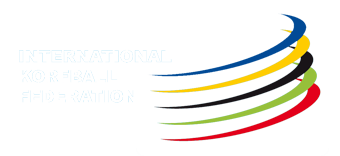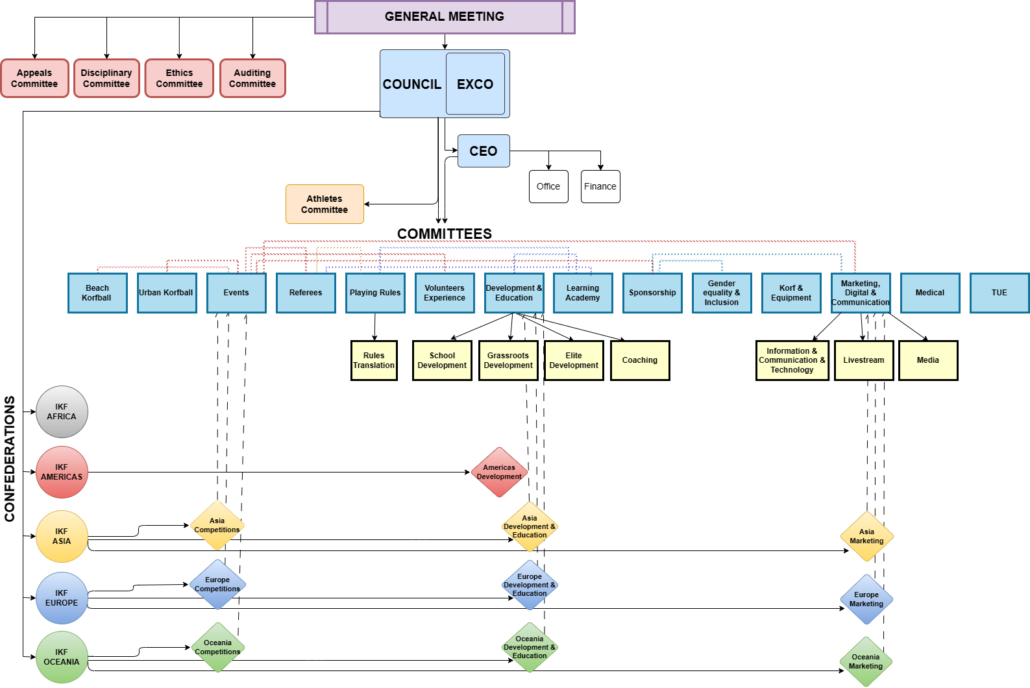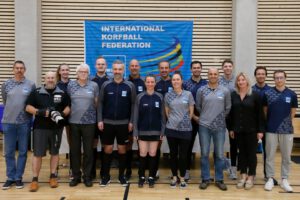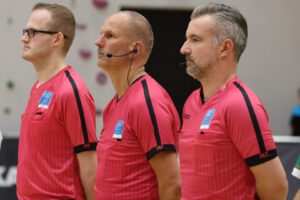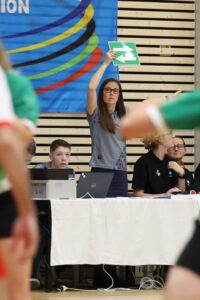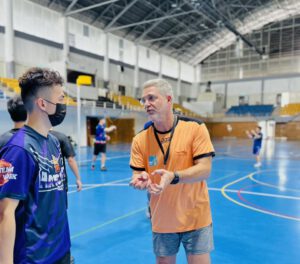About the International Korfball Federation
History
The International Korfball Federation (IKF) was founded in Antwerp (Belgium) on 11 June 1933 as a continuation of the International Korfball Bureau established in 1924 by the Dutch and Belgian Associations. The IKF was officially recognised by the International Olympic Committee (IOC) in 1993 and is affiliated to the Association of the IOC Recognized International Sports Federations (ARISF), the International World Games Association (IWGA) and the Global Association of International Sports Federations (GAISF).
Korfball is the only full (gender) equal sport in the world. With 100% gender-equal teams, included in the Playing Rules since the existence of the sport in 1902, it is fair to say that (gender) equality is part of the DNA and the key value for korfball.
IKF Executive Committee 2021
Mission and Vision
The dream and vision of the IKF is to be included into the Olympic Games program, being the first full (gender) equal sport on the Olympic Games. We believe that playing sport is much more fun together. Our ball bounces the same for everyone and everywhere. Because no matter who you are and what you do. Male or female, young or old, pro or amateur. We are all driven by the same value and principles That is the true power of equality. Korfball. Equality in Sports!
The mission of the IKF is to spread korfball around the globe and increase the number of athletes and their playing level by; 1) organising continental and world korfball events and 2) providing development support for the sixty-nine affiliated member countries (as per 1 January 2021) with education programmes, including financial and material support.
The IKF has established a network of contacts in many countries and actively promotes the game by transferring knowledge by exchange programmes and inviting selected korfball players, coaches, and administrators to its educations courses in order to create a stable local structure in all affiliated countries – see under IKF Members – on which a flourishing korfball organisation can be built. Key point in the IKF strategy is the youth development in all member countries.
The IKF stimulates the global awareness that korfball is a spectator, mixed gender, media oriented and innovative team sport. We do so by livestreaming all of the main IKF events.
Organisational Structure
The IKF is organised in five Continental Confederations – IKF Africa, IKF Americas, IKF Asia, IKF Europe and IKF Oceania – since 2011.
The IKF General Meeting is the highest authority in the IKF. The IKF is managed on a daily base by the IKF CEO, who reports to the IKF Executive Committee – 6 members – and the IKF Council – 10 members.
The members of the IKF EXCO are:
- Mr. Gabi Kool – President
- Ms. Joana Faria – Secretary General
- Mr. Jorge Alves – Senior Vice President
- Ms. Anita Derks – Member
- Mr. Björn Elewaut – Member
- Mr. Marc Verberk – Treasurer
- Mr. Dean Woods – Special Delegate
The IKF Council is staffed by the IKF EXCO Members, the Continental Vice Presidents, and the chair of the Athletes Committee:
-
- Mr. Inglish Huang – Asia Continental Vice President
- Mr. Yves Daelmans – Europe Continental Vice President
- Mr. Tim Miller – Oceania Continental Vice President
- Mr. Jordan De Vogelaere – Chair of the Athletes Committee
For an elaborate explanation of the IKF organisational structure, responsibilities of committees, all committee members and contact details of the committees, click here.
IKF Officials
IKF Officials are crucial for the successful organisation of IKF Events and development projects. National Federations can nominate referees and jury members for the IKF Referee list and the IKF Jury Members list. Furthermore, the IKF appoints a group of IKF Coordinating Officers, IKF Assessors and IKF Instructors in alignment with the National Federations. These Officials are appointed for IKF Events and projects, where they work on a volunteer basis.
A list of nominated IKF Officials can be found below:
IKF Coach Instructors – list to be added
Distinctions
The IKF honours those who have contributed to the development of korfball and the organisation in remarkable ways. There are three distinctions: IKF Honorary Member, IKF Badge of Honour and IKF Pin of Merit. The overviews linked below show the complete list of distinguished members and include links to the news articles about their distinction.
